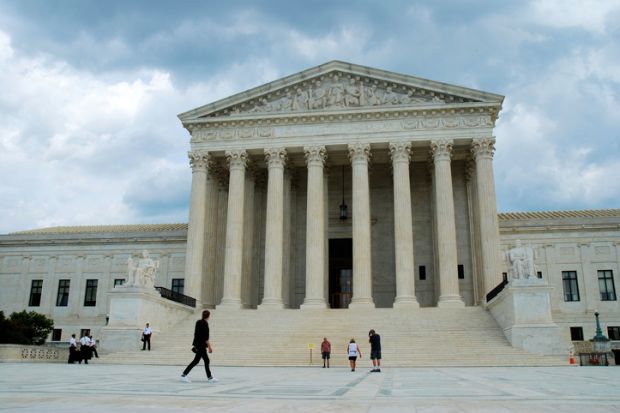The new US Supreme Court ruling against federal regulatory powers poses a deep, costly and fundamentally unpredictable threat to the norms of government oversight in higher education, the sector’s top expert body has warned.
The decision by the top court against its own 40-year-old principle known as Chevron deference is the latest overturning of key precedents by the majority of conservative justices created during the Trump administration.
The Chevron deference largely gave federal agencies the right to define the terms for implementing laws passed by Congress – often with a wide range of options and discretion – through a process that has come to be known as negotiated rulemaking.
The tool created by a 1984 Supreme Court case involving the major US oil company has played a central role in shaping a host of policies affecting higher education, including several that remain hotly contested, such as student loan protections, sex-based discrimination policies, accreditation, student visa processes, and the treatment of for-profit institutions.
Ending the Chevron deference likely will have far-reaching effects across higher education, many of them negative, said Matthew Owens, president of the Council on Governmental Relations, an association of US research universities that largely helps them with governmental and regulatory matters.
Even if US colleges and universities manage to avoid major unwanted shifts in federal policies, Mr Owens said, the process of adapting to a post-Chevron environment almost certainly will mean costly new work to build up and tear down regulatory compliance systems.
“This will waste valuable time and money that could be spent on teaching and research,” he said.
The shift also threatens longer-term costs and complications for higher education by likely creating a patchwork of regional differences in legal and regulatory interpretations, Mr Owens said.
“Just imagine the complexities this could cause when universities in different circuit court jurisdictions are collaborating on the same federal research grant but must comply differently with federal regulations,” he said. “Such complexities could ultimately discourage some research collaborations.”
Those cheering the Supreme Court rejection of the Chevron deference, however, included the nation’s chief grouping of for-profit colleges and universities, which have chafed under various “gainful employment” rules tying their federal student loan eligibility to the workplace success of their graduates.
Although presidential administrations can simply rewrite regulations drafted by their predecessors from the opposite political party, and have often done so, the association known as Career Education Colleges and Universities said it was grateful for the Supreme Court ruling because of its potential restraint of the Biden administration.
“No agency has overreached more in exceeding congressional authority than the current US Department of Education,” said the for-profit association’s president, Jason Altmire, a former Democratic US member of Congress.
“The Supreme Court has, once and for all, restrained the ability of the ideologically driven bureaucrats in the department to craft regulations based upon their own whims and biases, rather than what Congress had intended.”
But a current congressional Democrat, Bobby Scott, his party’s top-ranking member of the House education committee, said the prospect of higher costs and regulatory complexity is only part of the trouble now awaiting US higher education and many others affected by the loss of the Chevron deference.
The even bigger loss, Mr Scott said, was that courts around the country will now make ever more decisions on complex policy matters, rather than the subject-matter experts inside the federal government. “We are now at greater risk of falling into politicised legal battles wherein bad actors can use the courts to push their own political regulatory agenda,” he said.
It’s possible, however, that the Chevron deference might ultimately improve rules affecting higher education and other parts of society, Mr Owens said, if Congress decides to respond by hiring its own experts that let it become more precise in the laws it writes.
Register to continue
Why register?
- Registration is free and only takes a moment
- Once registered, you can read 3 articles a month
- Sign up for our newsletter
Subscribe
Or subscribe for unlimited access to:
- Unlimited access to news, views, insights & reviews
- Digital editions
- Digital access to THE’s university and college rankings analysis
Already registered or a current subscriber? Login








